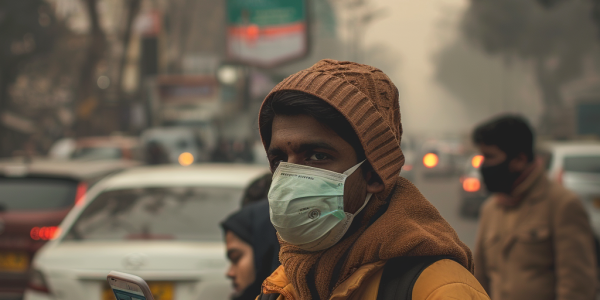SpaceX Secures $843 Million NASA Contract for ISS Decommissioning
Elon Musk’s SpaceX has secured an $843 million contract with NASA to decommission the International Space Station (ISS) as it prepares for its operational end after 2030. This crucial initiative aims to prevent Kessler Syndrome by safely guiding the ISS back to Earth, marking a significant transition in space exploration and environmental stewardship.
Air Pollution’s Disturbing Effects on Brain Health
Recent studies reveal a troubling link between air pollution and brain health, with 99% of the global population exposed to unsafe levels. Pollutants can damage neurons and alter brain communication, leading to increased anxiety, depression, and developmental disorders in children. The elderly are also at risk for cognitive decline and diseases like Alzheimer’s. Urgent action is needed to improve air quality through public transportation, electric vehicles, and green spaces to protect brain health.
Dramatic Fireball from Small Asteroid Lights Up Russian Sky
A small asteroid created a spectacular fireball over Russia’s Sakha region early Wednesday, captivating residents and highlighting the importance of astronomical monitoring. The European Space Agency detected the asteroid 12 hours before its entry, ensuring no damage or injuries occurred. This event underscores the significance of studying near-Earth objects and planetary defense as public interest in space exploration grows.
Innovative CSAR Technology Enhances Carbon Capture Efficiency
Researchers from SINTEF have unveiled the Continuous Swing Adsorption Reactor (CSAR), a groundbreaking carbon capture and storage (CCS) technology aimed at efficiently sequestering post-combustion CO2. With less energy consumption than traditional methods, CSAR promises to enhance sustainability in combating climate change. Successfully trialed at a waste combustion plant in Norway, this innovative system is set to revolutionize the CCS landscape, offering a cost-effective solution for industries looking to reduce their carbon footprint.
Air Pollution Linked to Rising Obesity Rates in Delhi
Recent studies reveal a troubling connection between air pollution and obesity, particularly in cities like Delhi, where severe air quality levels have been recorded. Health experts warn that pollutants such as PM10 and PM2.5 not only harm respiratory health but also contribute to weight gain and metabolic issues. With the Air Quality Index in Delhi surpassing 400, the need for urgent action to combat air pollution and its health implications has never been more critical.
Breakthrough Study Reveals Molecular Mechanisms of Air Pollution Formation
Recent research published in Nature Communications reveals groundbreaking insights into air pollution formation, focusing on the molecular mechanisms at the liquid-vapor interface. This study uncovers the complex acid-base equilibria that influence air quality and climate change, highlighting the unique behavior of pollutants like sulfur dioxide. Understanding these chemical dynamics is vital for developing accurate models and effective strategies to combat air pollution and its impact on global climate patterns.
Effective Strategies to Protect Your Health from Rising Air Pollution
With rising air pollution levels in metropolitan areas like Delhi, residents must take proactive steps to protect their health. Effective strategies include limiting outdoor activities during high pollution times, investing in air purifiers, wearing protective masks, staying hydrated, and monitoring air quality levels. By following these tips, you can minimize exposure to harmful pollutants and safeguard your well-being.
University of Utah Develops Compact Device to Harvest Water from Air
Researchers at the University of Utah have unveiled a compact device for atmospheric water harvesting (AWH) that could transform access to clean drinking water, especially in arid regions. This innovative technology utilizes advanced hygroscopic materials, specifically metal-organic frameworks (MOFs), to efficiently extract moisture from the air, addressing global water shortages and paving the way for sustainable solutions.
Study Reveals Immediate Adverse Effects of Air Pollution on Health
Recent research reveals the immediate adverse effects of short-term exposure to poor air quality, particularly PM2.5 particulate matter, on cardiovascular disease and mortality among cancer patients. Dr. Xiaoquan Rao emphasizes the critical importance of addressing air quality issues in cardio-oncology patient care. The study also highlights the higher risk of air pollution-related cardiovascular disease mortality among individuals with lower socioeconomic status, underscoring global health disparities exacerbated by air pollution.
Study Finds Trees Drive Air Pollution in Downtown LA
A groundbreaking study led by the University of California, Berkley, has revealed that urban tree canopies in Los Angeles are contributing to high air pollution levels despite reductions in vehicle emissions. The research highlights the impact of urban trees on pollution levels, with California’s 173 million urban canopy identified as a hidden source of pollution. Dr. Pfannerstill warns that rising temperatures escalate biogenic terpenoid emissions, contributing to ozone and secondary organic aerosol formation in cities like Los Angeles, San Francisco, San Diego, and Sacramento.










